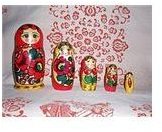Figuring Out Subject Nouns And Pronouns In Russian
Russian Cases
In English, we don’t really have cases. However, most languages do, and so learning them is of critical importance. The concept behind a case is that the word will change its form with a change of function. So, one may think of a noun changing form whether it is a subject, direct object, indirect object, etc., so that people can understand what you mean with less ambiguity. This is to be opposed to if the change in meaning was imparted through other means such as word order.
The subject in Russian exclusively takes what is known as nominative case, which makes things quite easy: in any dictionary, all nouns are found already in the nominative case, functioning as a “base case” from which all other cases are declined.
Subject Nouns
The only time you need to change anything in the subject is when the noun is in the plural:
For masculine nouns, if the word ends in a hard consonant or (rarely) a vowel, simply add or replace ы respectively. For any soft consonants, replace any accompianing й or ь, or simply add on, и. Examples: стол => столы, карандаш => карандаши, мужчина => мужчины.
For feminine nouns, replace а with ы, or я or ь (again, typically associated with soft consonants) with и. Examples: книга => книгы, женщина => женщины
For neuter nouns, replace о with а, and those few neuter nouns that don’t instead replace e with я. Examples: слово => слова, село => села, поле => поля
However, when pluralizing nouns, keep in mind some of the basic spelling rules of Russian. Also, keep in mind that some plurals are irregular, contradicting the above general rules, and just need to be memorized. Don’t forget to decline any associated adjectives and conjugate any verbs to the correct pro/noun gender and number.
Subject Pronouns
Russian subject pronouns differ a little from English, but if you are familiar with other languages such as French or German, then it will seem little different. Otherwise, they function almost precisely as they do in English in replacing a normal subject noun.
Я – I
Ты – You (informal)
Он – He, it (masculine)
Она – She, it (feminine)
Оно – It (neuter)
Мы – We
Вы – You (formal or plural)
Они – They
An example of each:
Я работаю - I work.
Ты работаешь – You (familiar) work.
Он/Она/Оно работает He/She/It works.
Мы работаем – We work.
Вы работаете – You (plural, formal) work.
Они работают – They work.
The “you plural” in particular is often difficult for speakers of English to grasp. Think of it like a “y’all”. The “you formal”, similarly, may be thought of like a “you sir” or “you ma’am” for any situation that calls for non-casual use, like in talking to teachers or to acquaintances.
Also, many speakers of English get tripped up on all the ways to say “it”. Always make sure to use the correctly gendered pronoun. It may seem strange to refer to a house with the same pronoun that you refer to your Uncle Larry, but that’s just how Russian and most other western languages work: proper and improper nouns alike share the same pronouns.
References
- Russian Spelling Rules from RussianLessons.net.
- Russian Present Tense Verbs, also from RussianLessons.net.
